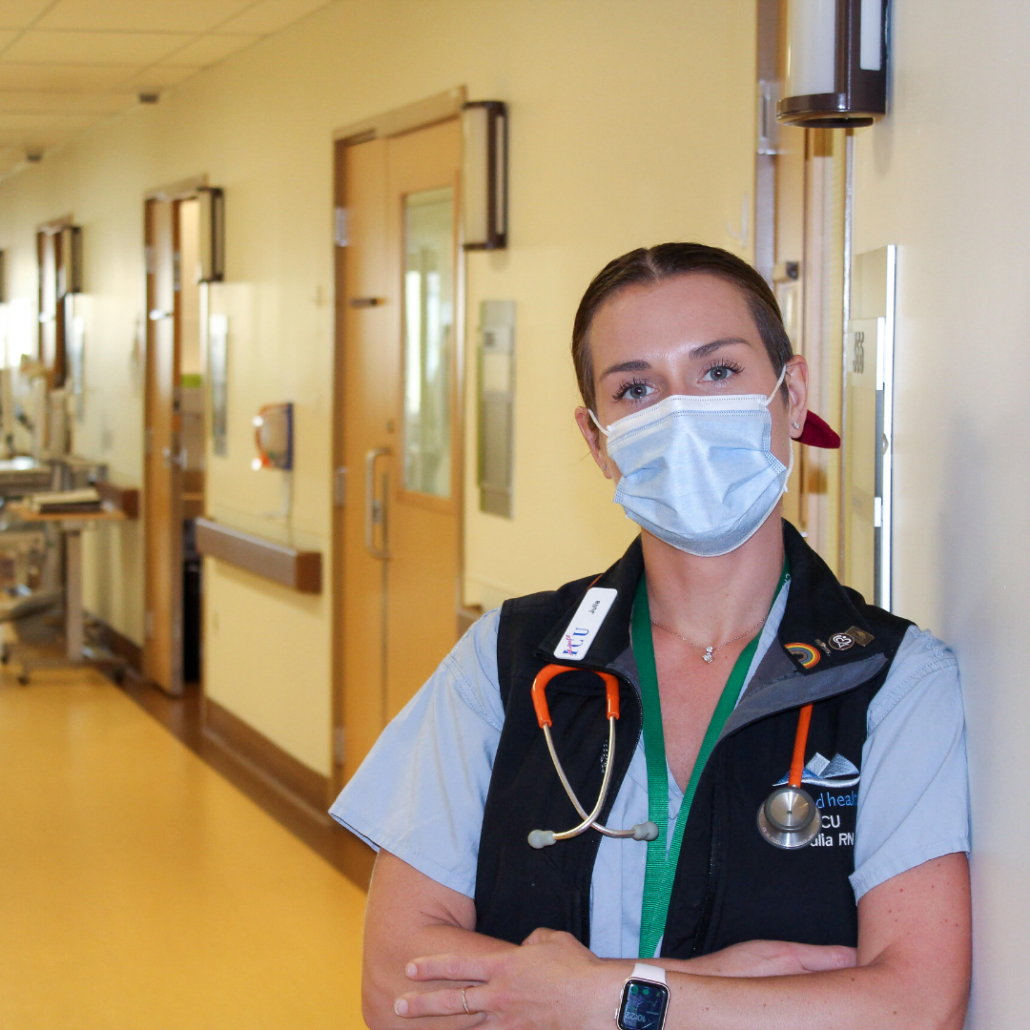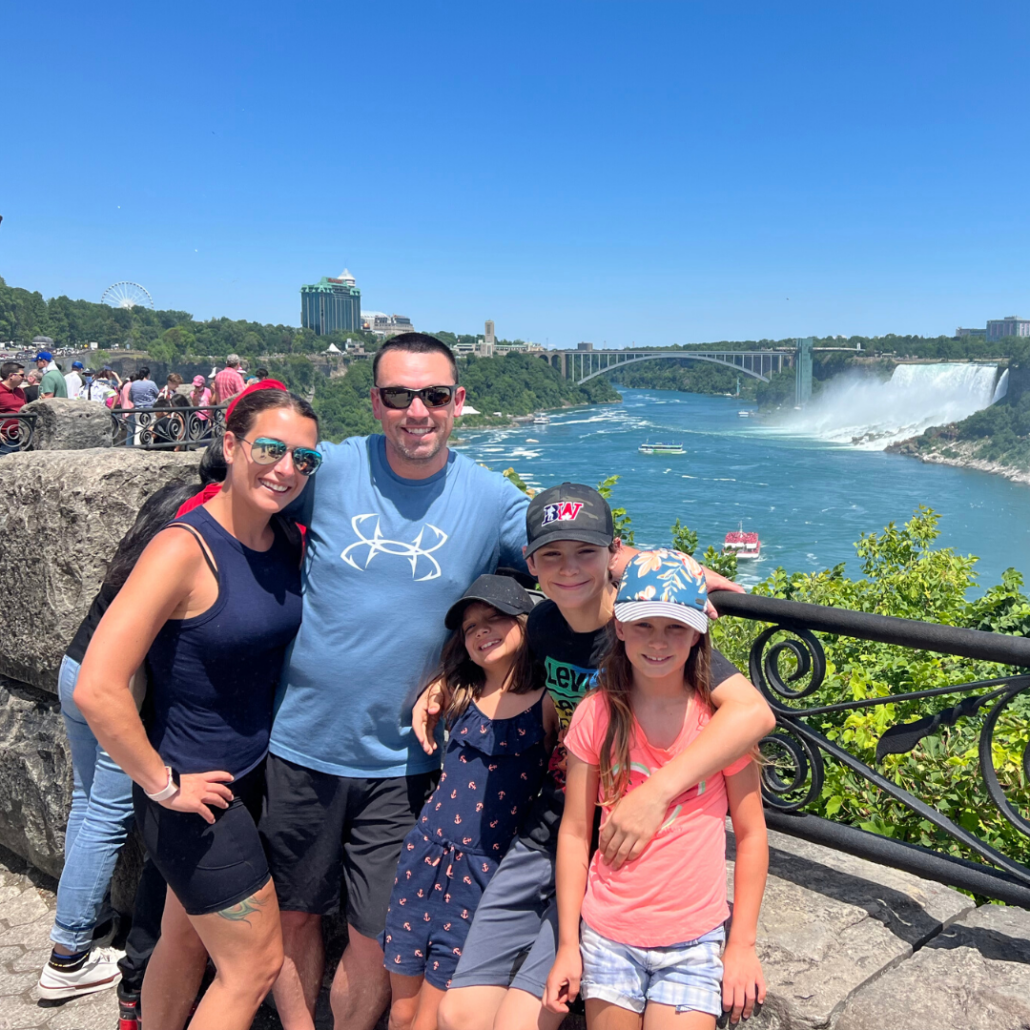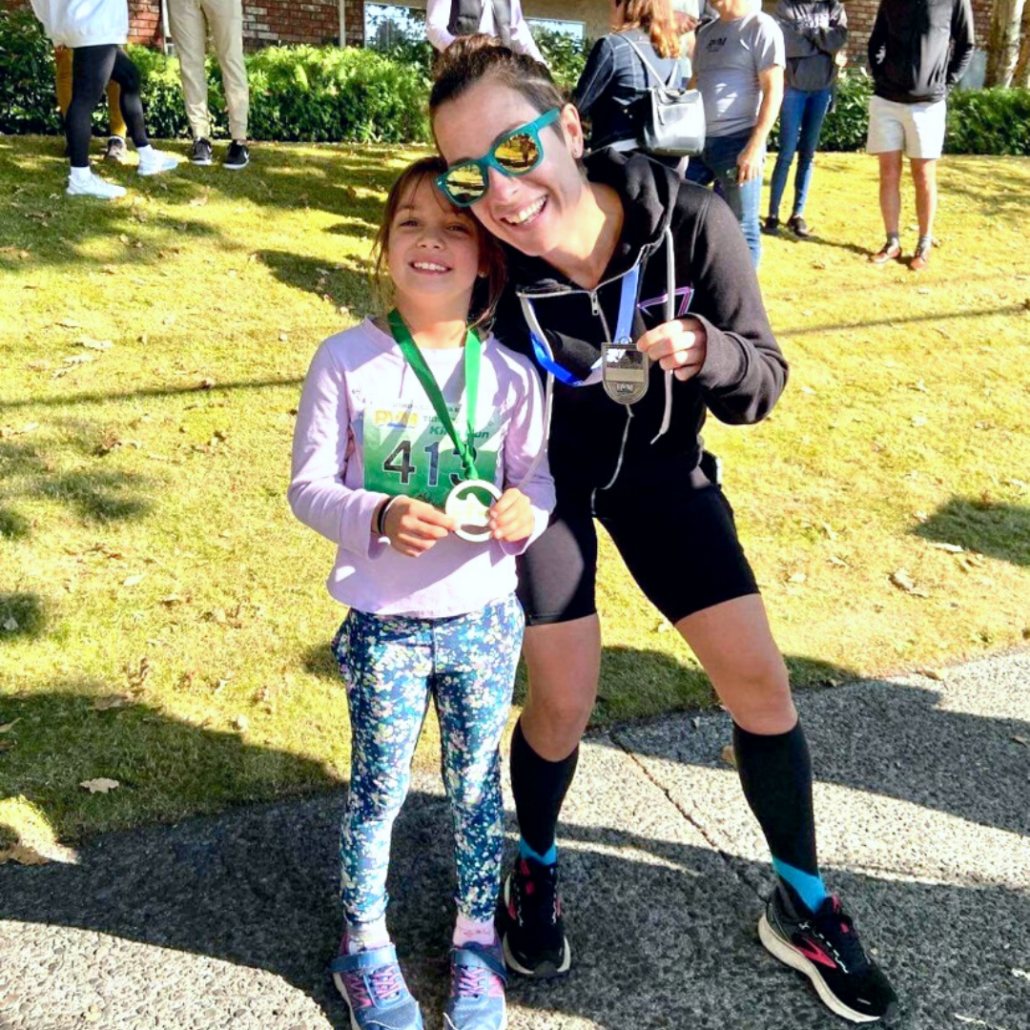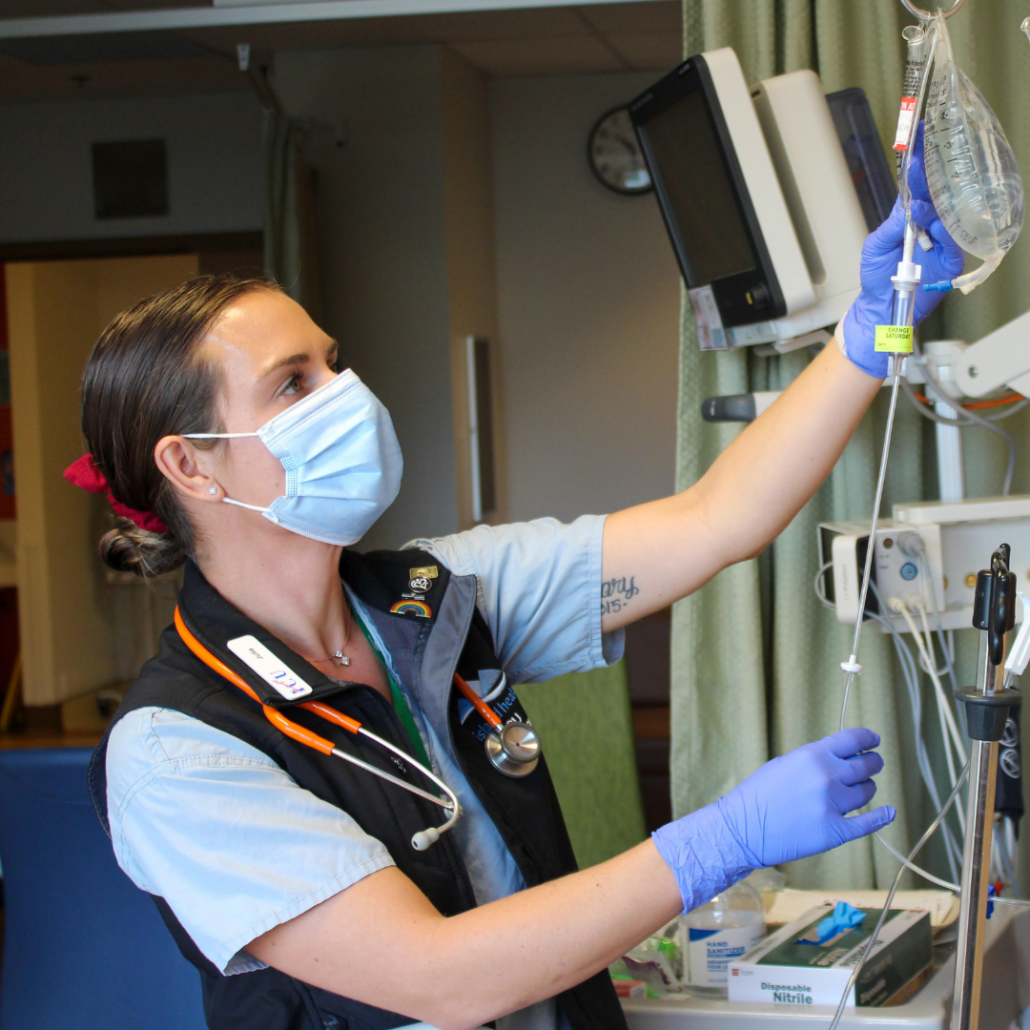
Julia Côté:
Registered Nurse and Clinical Nurse Leader of Critical Care ICU/HAU, Royal Jubilee Hospital; mom and step-mom, partner, runner, lover of black coffee, human
This too shall pass. It’s kind of my mantra for everything. Life is so short and, working in the Intensive Care Unit, we see death too regularly. It makes me realize that I have to let go of the small things—even the big things. You just have to let it go.
My love for nursing came from the ICU. There’s this group of nurses who become your family. When you are actively resuscitating a patient, you’ve got your team beside you and it’s the most beautiful thing to see all of us in action. It’s almost like a dance. We all have our roles and we just get to work.
I think you bond with your colleagues so much more when you are literally dealing with life or death. When you work a two-day rotation, you’re working 24 out of 48 hours. Sometimes you see your colleagues more than your own family. And they see all elements of you—your happy, angry, frustrated, and exhausted times. And, despite all the shades of who you end up being with them, they know you’re there for them too. That’s where the family develops and the bond forms.
I’ve worked as a Clinical Nurse Leader for two years now—a year in the ICU at Victoria General Hospital, and a year in the ICU and High Acuity Unit at Royal Jubilee Hospital. I realized there was something about leading a team that I really liked. It wasn’t the sense of power, but that I could bring people together to work as a unit. If we don’t work together as a team, we’re hooped. We’re only as strong as our weakest link, and as good as our strongest.
Back in 2020, I watched the first COVID-19 patient be admitted. We all just looked at each other and thought, here it is. This is the moment we’ve been scared of.
“My love for nursing came from the ICU. There’s this group of nurses who become your family.”
“I’m passionate about being a mom to step-kids. It comes easy to me to love them because I also care very much for the random strangers who are my patients.”
I’m a mom. My daughter, Izabella, is seven and a half and she’s my joy. I’m also divorced and I’m in a new relationship with someone who has two kids of his own. So we’ve got this cute little family together. His daughter Harper is nine, and his son Linden is 12, and it’s just so hilarious watching them together. It’s been three years of watching them age together, and it’s been so fun. Being a mom is my jam. I just love, love, love to care. I love helping. And I’m passionate about being a mom to step-kids. It comes easy to me to love them because I also care very much for the random strangers who are my patients.
My partner Jeff is my rock. He’s very grounded. Whether my day is good or bad, he knows how to just listen and hold me. I’m a very emotional person, and I tend to hold onto things harder than some people. I’m a big feeler.
When COVID hit, I was just moving in with Jeff. One day, I was in the car and I called him in tears. I didn’t know what to do. We both agreed that I would move back out. We wouldn’t even hug each other because we didn’t know if I had the virus on me. His son is immunocompromised. Being a mom, you want to protect your kids.
I didn’t see my daughter for a month. One day, my ex-husband brought her out to the boulevard. She was only five then. We had explained to her beforehand that we couldn’t touch each other. We had to keep our distance. But then seeing her in-person, and watching the sadness and confusion and the hurt that she felt—it was so hard. So hard not to be able to hug her. Dealing with COVID was so much more than just being a nurse and being in the hospital. It was what it did to our loved ones, and what it did to us.
My day always starts with a good, solid, large black coffee. I love coffee. Maybe that’s something no one knows about me—or maybe everyone knows? Anyway, I could drink it all day long and be very happy. I also love to cook. On a day off, I’ll make a family breakfast with the eggs, the bacon—all the good things. And then I’d want to do something fun with the kids. And we’ve got a dog who is a year old now. His name is Tucker. We might watch the kids do something active, or go for a hike with them and then just chill on the couch together while we watch a movie. It sounds very simple, but it’s just so amazing to spend time together as a family with no real agenda.
I’m also a runner. It gives me reprieve. I start running and it’s my way to let go and listen to some awesome music, which is also a huge passion. Music and running. Often, I find if I’ve had a really hard day, or I’ve lost a patient, running is my way to process things and release and let go. I want to complete a triathlon someday, but I’m a terrible swimmer. I doggy paddle! Really, half-marathons are my thing. On a real day off when I have nothing but time, I’d probably try to blow out a 20-25 kilometer run.
So, I’m a mom, a runner, and, honestly, I just really identify as a nurse. I would never leave nursing—it’s always been at the forefront for me. Before COVID, my daughter used to come up to the ICU to have my dinner break with me. She would walk around the ICU like she owned the place. Izzy was only three then, and every time I used to leave her to go to work, I would tell her that I had to go save a life. One day, one of our intensivists comes out and she’s all gowned up, and my daughter looks up at her and asks, “Are you a doctor?” She says she is, and my daughter says, “Go! Go save a life!” The intensivist burst out laughing, and I was like, that’s my daughter. She’s definitely the daughter of a nurse.
“Often, I find if I’ve had a really hard day, or I’ve lost a patient, running is my way to process things and release and let go”
“At the end of the day, we’re all just more or less trying our best. The time we’re here is a journey, and we need to be there for each other.”
My family is full of nurses. My aunts are nurses, and my nana was a nurse. My grandfather was a vet, and his mother was a nurse during the war. I started to connect more with my family when I got into nursing. I started to realize it was more than just a calling. I felt like it was in my blood—something that I was always supposed to do despite the fact that I never thought about it as a kid.
When a patient is in such a vulnerable position, it’s a privilege to be there and to care for their bodies as best as I can. It’s an honour, actually. When a patient is so sick, whether it’s with COVID or pneumonia or liver failure, and we have to keep them sedated so that their bodies can heal, I’ll go in and play music. You’re working one-to-one, so I’ll find out what kind of music the patient likes—it’s one of the first questions I ask when I meet the family or loved ones. And I’ll go into their room and play the music on my phone while I work. It’s therapeutic and it connects me with the patient. I’ll just talk to them as if I were talking to anyone else. I always like to believe they can hear me, and I’ll tell them what I’m doing, what the weather’s like, and what’s coming in the future.
In a different life, I wish I could have become a surgeon. I think I would like to complete a master’s degree and become a nurse practitioner at some point. But I’m still holding out for the day when we implement them more in the hospitals, because I love the hospital. I can’t leave acute care. There’s just something about it that is so special.
I love loving. I love taking care of my friends and family. Being there for the good, the bad, being vulnerable and open. Being humans, I think we need to be more caring towards each other. I struggle sometimes when I see so much criticism and negativity. At the end of the day, we’re all just more or less trying our best. The time we’re here is a journey, and we need to be there for each other.
They are humans first, who put other humans first.
More than 8,900 caregivers and staff work around the clock in our Victoria Hospitals
#HumansFirst is dedicated to sharing the stories from behind our hospitals’ frontlines. These stories remind us that those who provide care and keep the lights on in our hospitals also have lives outside of them. They have family and friends, they enjoy hobbies and interests, and they have all lived through their own personal triumphs and heartbreaks. Like all of us, they are human, and they have a story to tell.








